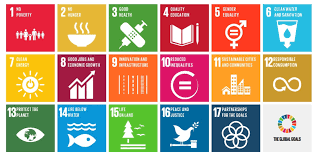The Importance of Sustainable Development Goals
Sustainable Development Goals (SDGs) are a universal call to action to end poverty, protect the planet, and ensure that all people enjoy peace and prosperity by 2030. Adopted by all United Nations Member States in 2015, the 17 SDGs provide a blueprint for sustainable development that addresses global challenges such as poverty, inequality, climate change, environmental degradation, peace, and justice.
Key Aspects of Sustainable Development Goals
The SDGs cover a wide range of interconnected issues that are crucial for creating a sustainable future for all. These goals include:
- No Poverty
- Zero Hunger
- Good Health and Well-being
- Quality Education
- Gender Equality
- Clean Water and Sanitation
- Affordable and Clean Energy
- Decent Work and Economic Growth
- Industry, Innovation, and Infrastructure
- Reduced Inequality
- Sustainable Cities and Communities
- Responsible Consumption and Production
- Climate Action
- Life Below Water
- Life on Land
- Peace, Justice, and Strong Institutions
- Partnerships for the Goals
The Role of Individuals in Achieving SDGs
While governments play a crucial role in implementing policies to achieve the SDGs, individuals also have a significant impact. By making sustainable choices in their daily lives – such as reducing waste, conserving energy, supporting ethical businesses, and advocating for social justice – people can contribute to the overall progress towards a more sustainable world.
The Path Forward: Working Together Towards Sustainable Development
>
.
Understanding Sustainable Development Goals: Key Questions and Concepts
- What are the 5 goals of sustainable development?
- What is sustainable goal development?
- What are SDGs and why are they important?
- What are the 5 P’s of sustainable development goals?
- What are the 17 SDGs and their meaning?
- What are the 5 themes of sustainable development goals?
What are the 5 goals of sustainable development?
The five goals of sustainable development encompass key areas crucial for creating a more sustainable future for all. These goals include ending poverty, ensuring food security, promoting good health and well-being, achieving quality education for all, and fostering gender equality. By addressing these fundamental aspects of development, we can work towards building a more equitable and prosperous world that prioritizes the well-being of people and the planet.
What is sustainable goal development?
Sustainable Development Goals (SDGs) are a set of globally agreed-upon objectives designed to address pressing challenges such as poverty, inequality, climate change, and environmental degradation. Sustainable goal development refers to the process of working towards achieving these goals in a way that ensures long-term social, economic, and environmental sustainability. It involves implementing policies and practices that promote inclusive growth, protect natural resources, and enhance the well-being of present and future generations. By focusing on sustainable goal development, countries and organisations aim to create a more equitable and resilient world for all.
What are SDGs and why are they important?
The Sustainable Development Goals (SDGs) are a set of 17 global objectives established by the United Nations to address pressing challenges such as poverty, inequality, climate change, and environmental degradation. These goals serve as a universal call to action to achieve a more sustainable and equitable world by 2030. They are important because they provide a comprehensive framework for governments, organisations, and individuals to work towards common objectives that promote economic growth, social inclusion, and environmental sustainability. By focusing on areas such as education, healthcare, clean energy, and responsible consumption, the SDGs aim to create a better future for all while preserving the planet for future generations.
What are the 5 P’s of sustainable development goals?
The 5 P’s of sustainable development goals are often referred to as People, Planet, Prosperity, Peace, and Partnerships. These principles encapsulate the core aspects of sustainable development, focusing on the well-being of people, the preservation of our planet’s resources, the promotion of economic prosperity for all, the importance of maintaining peace and stability, and the necessity of collaboration through partnerships to achieve sustainable outcomes. By addressing these 5 P’s collectively, we can work towards a more sustainable future that benefits both current and future generations.
What are the 17 SDGs and their meaning?
The 17 Sustainable Development Goals (SDGs) are a set of global objectives established by the United Nations to address pressing challenges and promote sustainable development worldwide. Each goal represents a specific area of focus, ranging from ending poverty and hunger to ensuring access to quality education, clean water, and affordable energy. The SDGs aim to tackle issues such as gender equality, climate action, sustainable cities, and responsible consumption. By working towards these goals collectively, countries can strive towards a more equitable, prosperous, and environmentally sustainable future for all.
What are the 5 themes of sustainable development goals?
The five themes of Sustainable Development Goals (SDGs) encompass a broad spectrum of interconnected issues that are essential for achieving sustainable development worldwide. These themes include eradicating poverty, promoting good health and well-being, ensuring quality education for all, fostering gender equality, and addressing climate action to mitigate environmental challenges. By focusing on these key areas, the SDGs aim to create a more equitable, prosperous, and sustainable future for people and the planet.

